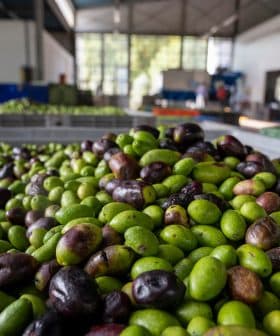Spanish Baker Launches Olive Oil-Based Pastry Range

Europastry, in collaboration with Verdeo, has launched a new range of pastries in Spain called ‘Olive,’ made with 100-percent olive oil instead of traditional fats, aiming to provide healthier and more sustainable options for consumers. The ‘Olive’ pastries contain unsaturated fats, antioxidants, and polyphenols, offering a healthier indulgence with less sugar and cholesterol, while also reducing the carbon footprint of baking and promoting the use of olive oil in the baking industry.
Europastry brands itself as an industrial baking company “with a start-up mindset,” trying to change the norms of traditional baking.
In conjunction with Verdeo, a company dedicated to creating new ways to use olive oil in food products, Europastry has launched a range of pastries in Spain known as ‘Olive.’
This range brings together innovation, health and flavor, and opens a range of possibilities for the future.
Including croissants, donuts and muffins, these pastries are made with 100-percent olive oil instead of butter and palm oil. Iris Roldán, the communication manager at Europastry, told Olive Oil Times the new pastries are healthier and more sustainable while maintaining traditional flavors.
See Also:Cooking With Olive OilThe final product contains monosaturated and polyunsaturated fats, antioxidants and polyphenols and maintains a good crumble, appearance and flavor.
They also have less sugar and cholesterol, making them attractive to the consumers as a healthier indulgence that provides the pleasure of eating a pastry with fewer downsides.
“This range of pastries is revolutionary because it uses olive oil as vegetable fat,” Roldán said. “Thanks to the innovative Verdeo process, we managed to solidify the olive oil using sustainable best practices, thus replacing saturated animal fats and hydrogenated vegetable fats.”
According to Europastry, ‘Olive’ pastries contain more than 84 percent unsaturated fats. Extra virgin olive oil, for example, contains the smallest proportion of saturated fat, about 15 percent. Meanwhile, palm oil contains 50 percent saturated fat, margarine and lard around 40 percent and sunflower oil about 15 percent.
Verdeo took years to develop the process industrially and overcome the challenges of converting olive oil into a solid form, which may be used in baking. Unsaturated fats are usually liquid at room temperature, while saturated fats are solid.
Verdeo’s goal was to incorporate olive oil and its unique health benefits into a baking process that can be used at both industrial and artisanal scales. According to the company, this new baking method is less costly and reduces the carbon footprint of baking.

Dots Glace Palm Free (Europastry)
In 2016, the International Olive Council estimated for every liter of virgin olive oil produced “in a mature semi-intensive orchard with an average crop yield,” there is net carbon sequestration of 8.5 kilograms.
Meanwhile, more countries continue to scale back on palm oil imports and production as a result of the crop’s high environmental toll.
“This process brings us closer to one of our goals, to make a healthier, more sustainable and top-quality pastry,” Roldán said. “With Verdeo, we revolutionized the world of pastries, thanks to an innovative process that has such an essential product in our Mediterranean diet, olive oil, at its center. This range brings together innovation, health and flavor, and opens a range of possibilities for the future.”
Roldán added that the ‘Olive’ project is one of the first success stories of the Baking the Future accelerator, a six-month incubator in which Europastry invites startups to come to their research facility in Barcelona and develop their products.
“Europastry has accompanied Verdeo, supporting the startup with all its experience and technology,” Roldán said. “This project was one of the first successes of our Baking the Future accelerator, the objective of which is to promote the talent and development of the most cutting-edge startups in bakery innovation.”
In September, Baking the Future will announce five new projects with the same goals in mind as the ‘Olive’ line.
“We are sure that it will be a success and that they will provide us with revolutionary ideas that will change the way we conceive baking,” Roldán concluded.









